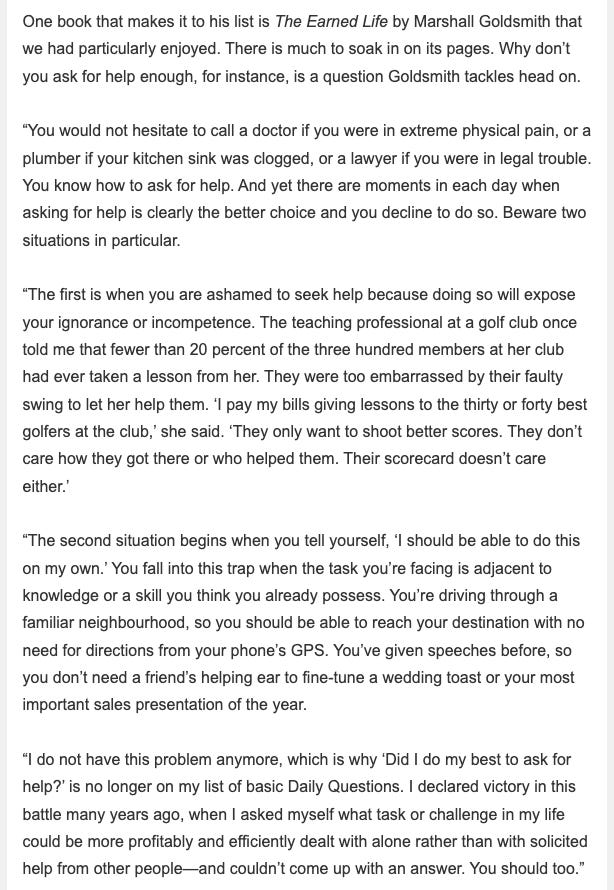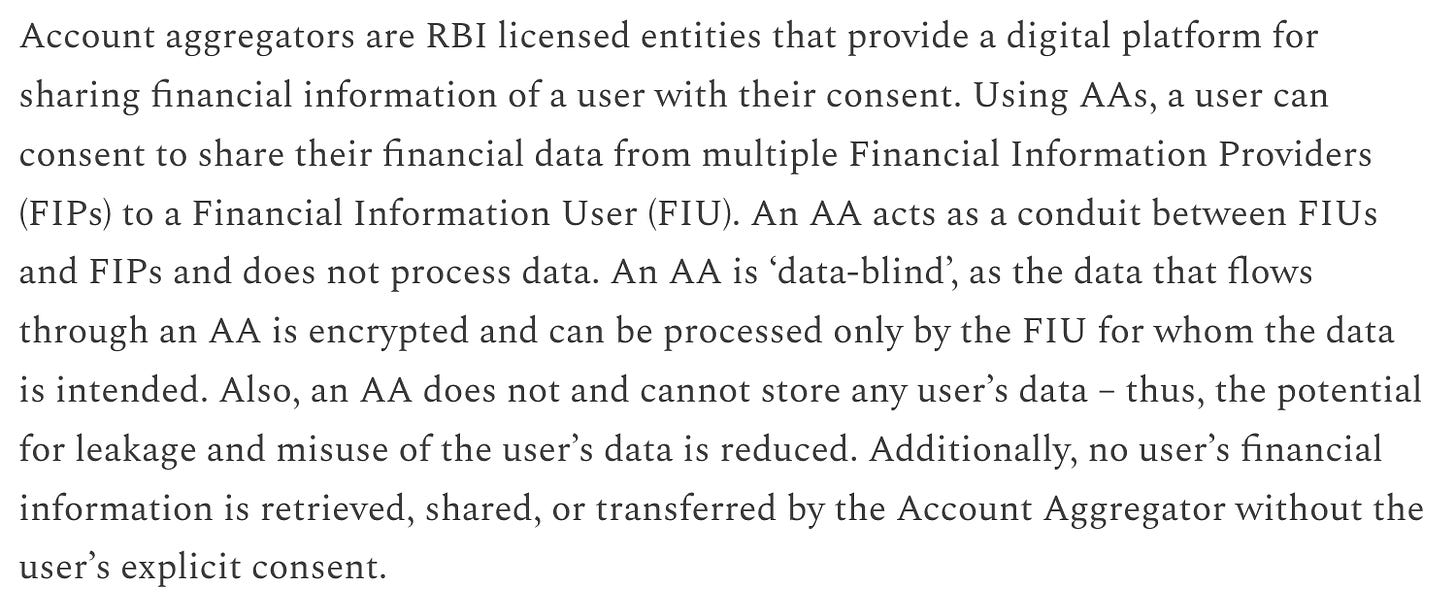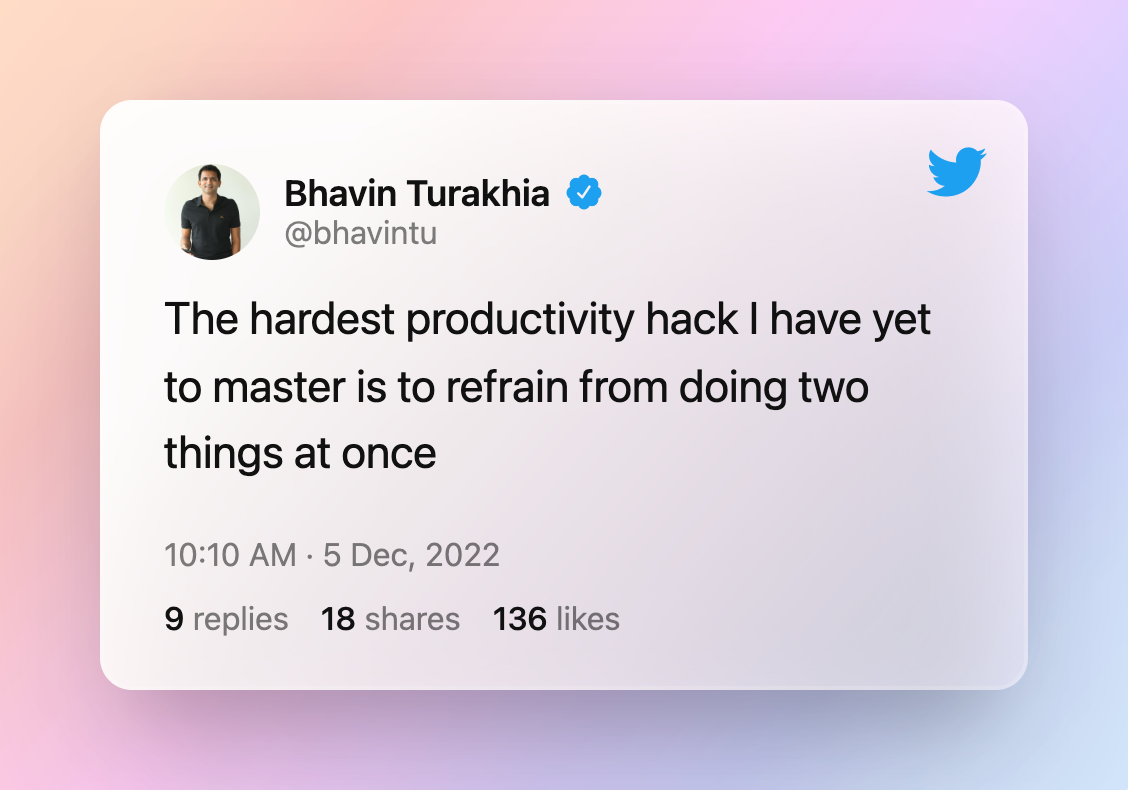#84 Everything’s been done before. The scenes change but the behaviours and outcomes don’t.
Lessons on product building, designing with empathy & building trust.
Hey there,
I subscribe to the Founding Fuel newsletter for the amazing intro notes they share everyday. Their pick of books & insightful snippets from these books is unmatchable. Here’s one such intro note from a recent post. I’m taking it as is to get today’s post started.
And now that you’ve had a great start, let’s get to today’s discoveries.
1. Lessons on product building
Nathan Baschez recently concluded his 3 part series on product building. He talks of the journey all the way from “coming up with the idea” to “launching” in these posts. His approach & suggestions are nothing extra-ordinary. However, he makes it a worthwhile read with his unique storytelling.
Here’re some of the snippets from the last post that covers getting feedback, position & launching.
In other words, you’re looking for the product’s engine and drag. (I use the same framework to evaluate essays, too.) The engine is the reason anyone shows up or cares in the first place, and drag is all the little problems and confusing parts that get in people’s way.
…
When a user just likes a product, they will be polite. They’ll congratulate you. They’ll look for something positive to say about the product. But it will be the same tone of voice they use when they’re looking at a friend’s wedding photos. The overall vibe will be “good for you” rather than “good for me.”
2. Designing for access-constrained users
Here’s how the design team at Spotify defines access-constrained users.
Users who find it harder to access online products are “access constrained”, which generally describes three categories of limitations: device, data and network constraints.
There are some common themes around how their digital experiences are, no matter of the geography they are from.
Spotify team uses “performance cards” to sensitise their product builders & designers around the challenges faced by these users. They also include some helpful prompts to verify if their ideas are catering to the needs of these access-constrained users.
You can access these performance cards here. If you’re into design, give them a quick read or two. Will help improve your thinking around designing for such users.
3. Design principles for data sharing
I recently read about Account Aggregators (AA) and got intrigued about the idea. While digging through the available material on this topic, I came across a really interesting post by D91 Labs. Dharmesh, Geetika and Lakshmi propose a set of design principles for consent driven data-sharing to ensure a safe, smooth, and intuitive experience for the users.
For the uninitiated, here’s a quick summary of what Account Aggregator framework offers:
And now to the design principles:
Establish authenticity to gain trust: How might we gain the trust of the users to adopt account aggregators to share data?
Provide contextual information: How might we create a positive behaviour change by providing necessary information at the right time?
Nudge to make relevant choices: How might we help the user in making relevant choices?
Enable data sharing controls: How might we enable the users with controls to share their data?
Establish grievance redressal workflows: How might we support the users with their queries post data sharing?
Provide visual cues: How might we boost the confidence of the user through appropriate feedback loops?
At its core, they are applicable to any product or service where user trust is a key factor in customer’s involvement. The post does a fairly good job in explaining these points with relevant examples & visual references.
4. Life changing ideas
Morgan Housel has an uncanny knack to tell stories that connect at multiple levels. He picks them up from some of the most unconventional sources - literature, forgotten history, politics, financial markets & educational institutes.
In a recent post, he talks about ideas that changed his life. Some really good food for thought here. I’m sharing my favourite bits below:
Tribes are as self-interested as people, encouraging ideas and narratives that promote their survival. But they’re exponentially more influential than any single person. So tribes are very effective at promoting views that aren’t analytical or rational, and people loyal to their tribes are very poor at realizing it.
Everything’s been done before. The scenes change but the behaviors and outcomes don’t.
Self-interest can lead people to believe and justify nearly anything.
5. Scents & sensibility
Scents and sensibility takes a little philosophical take on our understanding of fuzzy things. Brian Eno talks of his experiments of ‘mapping’ the world of smell. And the process leads him to realise that such a clear understanding is missing from many more fundamental concepts that we swear by everyday.
Some of my favourite bits:
It's strange how you arrive at ideas, how thoughts consolidate themselves out of the most disparate and unlikely beginnings, and how often those beginnings are realizations from experience that something isn't possible (or alternately is possible but not interesting).
..
The history of the history of art is really the story of people trying to make a claim form one orthodoxy in favor of any other, asserting that the particular line that they drew through the field of all the events we refer to as Culture had some special validity and the proximity to that line was a measure of originality, profundity, longevity: in short, of value.
…
the sense of belonging to a world held together by networks of ephemeral confidences (such as philosophies and stock markets) rather than permanent certainties, predisposes us to embrace the pleasures of our most primitive and unlangued sense. Being mystified doesn't frighten us as much as it used to.
This one is a good read for seeding some new ideas.
(via FS Blog)
6. Movies for the festive season
If you’re like me (in a festive mood, or with little kids at home, or both), then you would have started your annual binge of Christmas season movies on Netflix & others. There are tons of new titles that have gone live in the last couple of weeks. Some have been re-released (or re-listed to be more accurate). You will never know, because they all look the same. Here’s a really fun and insightful read on how all these films get made - good, fast, or cheap (most of the time only the last two of those). This piece in Vulture treats you with some real fun facts and behind the scene - equally enjoyable as these movies themselves.
And if you’re not into Christmas movies, I’ve another recommendation for you. Check “The Swimmer” on Netflix. Here’s how Netflix describes the movie’s plot - “From war-torn Syria to the 2016 Rio Olympics, two young sisters embark on a risky voyage, putting their hearts and their swimming skills to a heroic use.” You may not have heard about the Mardini sisters before this. Watch this movie to know their story. A really inspiring tale, told really beautifully. Highly recommended.
(via Polina’s “The Profile” newsletter)
7. Everything else
Some random goodness from the internet:
Charles Young makes beautiful stop motion animation with his paper models. Check out his work at Paperholm (via Dense Discovery)
Kevin De Bruyne on dealing with the spotlight, life at home and whether he gets paid too much.
Hundreds of Yeti Coolers are washing up on Alaska’s coast. Where did they come from? Flotsametrics has some answers. (via Morning Brew)
Why do we call it breadcrumbs? And radio buttons? Some unofficial history of UI components (via Stoa Daily)
I trained an ai chatbot on my childhood journal entries - so that I could engage in real-time dialogue with my "inner child" (via Twitter)
Everything is awful and I'm not okay: questions to ask before giving up.
The forger who saved 1000s of Jews from the Nazis. (via Kottke)
Before we sign off, here's a bitter truth of a productivity hack.
That's all for this week, folks!
I hope I've earned the privilege of your time.
If you enjoyed this post, show your love by commenting and liking it. I write this newsletter to share what I learnt from others. If you learnt something from this today, why not share it with a couple of your friends to continue this chain?








Thank you so much for the read. :)
1-I really like the piece of advice from the "The Earned Life" by Marshall Goldsmith, very much applicable for better growth.
2-"Everything is awful and I'm not okay: questions to ask before giving up." Very basic & simple questions to give insight on self & analyse better, it's amazing.